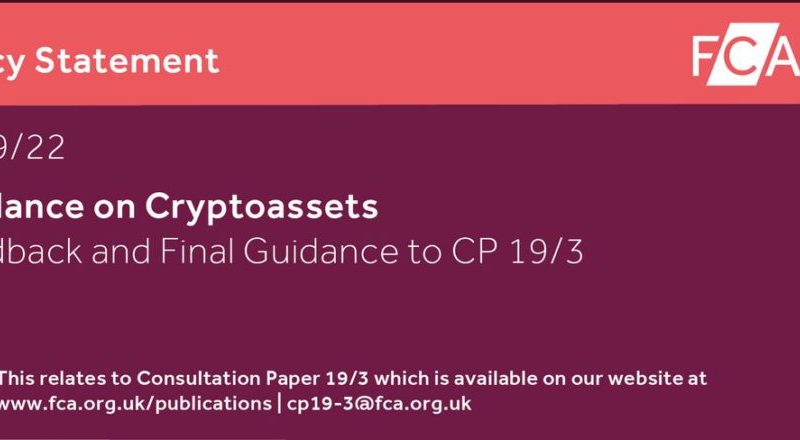Expert commentaries: UK Financial Conduct Authority final guidance on crypto asset
As you may know, yesterday, the UK Financial Conduct Authority published its final guidance on crypto assets, defining what tokens come under its jurisdiction, classifying what it considers the 3 main types of tokens: Security, E-Money and Unregulated tokens.
In response to the report, a number of experts in the space have provided their insights, received through Wachsman and copied in below.
Aries Wang, CEO, and Co-Founder of Bibox, the AI-enhanced, encrypted digital asset exchange
Q“In an ideal scenario, all firms dealing with crypto assets should be enforcing a degree of self-regulation, however, a defined regulatory perimeter for those involved with the issuance, creation or trading of crypto assets will help to keep the industry in line. The FCA is by no means driving regulatory change but as an influential force in the European market, we foresee the typology and guidance being rolled out as an industry standard.
The paper critiques a supposed inherent intention to remove token holder rights in the case of what the FCA categorizes as “exchange tokens”, the umbrella term for cryptocurrencies, crypto coins, and payment tokens. While exchange tokens, including Bitcoin and Ether, fall outside of the remit of the FCA citing concern for consumer protection, little consideration was given to the vast benefits to users who have lost faith in traditional market mechanisms in ensuring market integrity and entirely dismissing the role of 5AMLD (Anti Money Laundering Directive).
Clarification from financial authorities is vital for both protecting consumers and keeping players in check, yet the lack of understanding of DLT is apparent in this still somewhat cloudy and tentative guidance.”
Charles Phan, Founding Engineer of Interdax, the all-in-one cryptocurrency exchange providing a safe, secure, and more efficient platform to the masses through innovative derivatives contracts
"Given how the FCA has listened to the industry about which tokens to regulate, actively seeking industry feedback, it is unfortunate they have taken a blanket approach regarding crypto derivatives. Crypto derivatives are a field ripe with innovations benefiting the retail investor and it would be unfortunate for UK firms to be excluded due to events experienced in the regulated financial world.
While the guidance seems sensible and aligned with the approach taken in several other countries, their proposed ban of derivatives built on top of the “exchange tokens” seems excessive, ill-suited and could simply push innovation overseas. These products will continue to thrive in the coming years to potentially become the most valuable niche of the crypto ecosystem, replicating what happened in the traditional markets. If the FCA is too stringent on in-demand crypto assets, it risks further isolating itself from a rapidly growing and highly fruitful market."
Filipe Castro, Co-Founder, and CIO at UTRUST, the cryptocurrency payment solution offering instant transactions, buyer protection, and crypto-to-cash settlements
“By issuing its final guidance on crypto assets, the UK Financial Conduct Authority has clarified its position on which token categories fall within its jurisdiction.
FCA’s classification considers 3 main types of tokens: Security, E-Money and Unregulated tokens. This a very positive development, representing a balanced and pragmatic approach to the ecosystem with clear guidelines. Furthermore, the consideration of a separate category for e-money payments tokens highlights the growing market demand for this segment, by acknowledging that “certain utility tokens can also be used to facilitate regulated payments, particularly where their volatility has been stabilized.” This is likely to further attract blockchain start-ups to consider the UK as a favorable place to develop their technology and products.
Iain Wilson, Advisor to NEM Ventures, the venture capital and investments arm of the NEM blockchain ecosystem
“Repositioning the token taxonomy to distinguish security tokens from e-money tokens is positive; regulation for securities should be structured differently from payments. The overall guidance provides a framework for distinguishing between regulated and unregulated tokens, as well as detailing the firm and individual activities that fall within the scope of FCA Authorisation. Whilst some survey respondents continue to look for global regulatory harmonization, we feel that this is unlikely in the foreseeable future."


